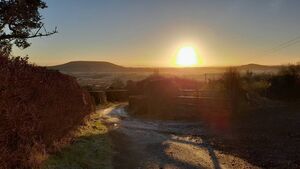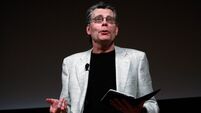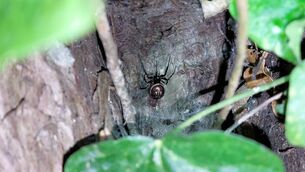My Dad died in December... it's the month I always associate with him

My grandfather was asked to return to the Ox Mountains to take over the family farm. This he did, reluctantly it would appear.
My father was born in December and 97 years later, he died in December. When I reflect back over his long life, December is therefore the month of the year that I most associate him with.
As I write about my father here, I imagine him, not just as MY father, but as the quintessential father who symbolised a particular generation of men who worked hard on small farms. These men laboured without much fanfare or fuss; their dedication to family and their pride in their work was all the reward they got.
Men like me, who grew up in the 60s and 70s, had a real issue in deciding what to call their fathers. Daddy was okay when you were of a certain age but no longer cool when you were out with the lads. The Old Man, The Ould Fella or The Ould Buck, soon took over. I was never comfortable with any these titles; I always felt I was betraying Daddy, my favourite name for him. Over the years, as a compromise, I settled on Dad. I could say it to his face and I could use it while talking about him to others.
Dad was born in the townland of Cloonbaniff on December 5, 1911, just as RMS Titanic was getting its final lick of paint. Ireland was still part of the British Empire back then but life on a small farm, along the banks of the river Moy in south Sligo, remained simple and far removed.
My father’s father was born in 1881. When he left home to seek a living elsewhere, he went to Liverpool, where he became a policeman. He seemed to be quite happy there until, a few years later, he got a telegram from home informing him that his brother in the home place had died unexpectedly. He was asked to return to the Ox Mountains to take over the family farm. This he did, reluctantly it would appear.
Later, he met and married my grandmother, the local lace-making teacher. These two people gave my father a unique set of influences, one was a reluctant farmer who liked his books, his music and an occasional grass of whiskey and the other was an artist with a huge work ethic.
Dad always maintained that he learned the ways of farming from a neighbour and not from his father as one might expect. He told me in his later years that visiting this neighbour on a regular basis was his university education. The neighbour was knowledgeable and particular in his methods and my father was eager to learn. They proved a good combination and this ‘education’, coupled with my father’s work ethic, set him up to take over the farm when his father died in 1941.
Dad came to farming when there was very little mechanisation on small farms in the West of Ireland. The work was largely done with shovel, turf spade, scythe and pitchfork. Later, horse-drawn machinery came in but it wasn’t until much later, when my father was nearing the end of his farming life, that tractors began to make an impact.
I often reflect on the amount of work my father got through in his lifetime. Most of it was painstaking and took place in all weathers. His days often started before dawn and in winter, it would be dark night by the time he would get finished. Every job, from spreading top-dressing to cutting the turf, from saving hay to harvesting the oats, was done through manual labour, often in a very solitary way and always competing with the elements. Modern thinking points to the value of living close to the land but such labour was no panacea for contentment. My father’s work was tough work and failure in any one area could severely impact his whole year.
Dad married in June 1945. He was 33 and my mother was 21. He had to wait until the place was free for him to bring in a wife. They proved to be a great team and between 1946 and 1961, they brought seven of us into the world.
They both worked hard, they had to. In time, one of the benefits of the growing family was that my father now had help. Farming chores were part of every child’s life at that time and, for the most part, proved to be a good grounding; providing a valuable all-round education for life. Back then, whatever the hardships, children certainly knew where their milk and their spuds came from. Being the youngest, I escaped a lot of the hard work that my older brothers and sisters had to endure. In fact, I had the best of both worlds; less work and a father who was mellowing with age.
My father was almost 50 when I was born. As time went on, he became more like a grandfather to me than a father. He always maintained his work ethic, right up to his last days in fact. When he handed over the farm on to my oldest brother, Dad continued to maintain his interest in the place. He would help with odd jobs while offering advice from his lifetime of experience. He also offered words of caution as post-EEC farming practices took on a faster pace.
Dad could never understand people taking holidays. He was utterly bemused by the concept and once said to me that his idea of a holiday was getting time and space to do a nice job. Knowing my father’s way of thinking, what he meant was that he could get time to indulge in a job he would not otherwise have time to do. These jobs often drew on his artistic side, which he had inherited from his mother. He could run up a willow basket in the same way that my mother could knit a jumper. He might take an hour at night to play a few tunes on the fiddle or he might simply hop on his bike on a Sunday afternoon to visit his cousin who lived 10 miles away. These were his holidays. I always loved the television programmes, and . Now I can see why; Dad’s way of living was that of the frontier, where hard work was essential and relaxation could prove fatal.
Dad died on December 26, 2008. The timing seemed just right. While not given to much celebration in his long life, he liked Christmas. He was dedicated to the church devotions and the once-a-year festival seemed to fit his measure.
When I think of my father and reflect back over his long life, I mostly see him in the month of December, working morning and evening despite harsh weather and dark days. Work seemed to bring him a certain pleasure. He liked being productive, and getting through a job always provided him with a great sense of satisfaction. He was at his happiest while starting or finishing a job. In between however, the pressure was on!
He did relax that bit more at Christmas time. We used to get a huge Christmas box from our uncle in Athlone. My dad would plonk the big box up on the kitchen table and taking his pen-knife from his pocket, he would slowly begin to open the box. He would then proceed to empty the box, item by item, handling the contents with great deliberation as he placed them on the table before us.
He knew little about Santy’s plans for his children but always played his part in creating expectancy. He might even be prevailed upon to join in a game or two but this was a short-lived departure. Invariably a cow needed to be checked or a new calf needed to be fed.
So, at this time of year, in memory of men like my father, Happy Christmas… and thank you.





